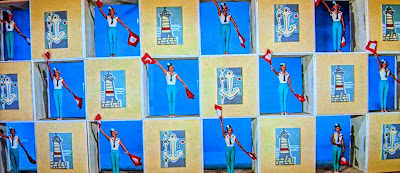This year's festival was a strong outing, with a particularly commendable array of retro screenings that proved to be every bit as compelling as the best new material on offer. I saw 16 films in 2024, the same as last year, and nearly all were in the Embassy Grand apart from one at the Roxy and one at the Lighthouse Cuba. Here's my overview of the films I saw, in rough order of preference, beginning with those I enjoyed most. (They ranged from definitely worthwhile to thoroughly excellent - no duds this year!) I'll just blurb the new films, because the vintage titles speak for themselves - must-see classics all. But special mention should go to Sir Peter Jackson, who kindly ventured to the Embassy to introduce the 30th anniversary screening of the 4K restoration of his 1994 masterpiece,
Heavenly Creatures, sitting in the audience with fellow director Andy Serkis.
Top of the class retro classic legends:
Days of Heaven (dir. Terrence Malick, US, 1978)
Paris, Texas (dir. Wim Wenders, Germany/France, 1984)
Heavenly Creatures (dir. Peter Jackson, NZ, 1994)
Everything else:
Eno (dir. Gary Hustwit, US, 2024)
American documentarian Gary Hustwit has already excelled with his design-themed 'documentart' films
Helvetica,
Objectified,
Urbanised and
Rams (a biography of German industrial designer
Dieter Rams, not the Icelandic drama or its Australian remake). In
Eno he brings his interest in the structure and composition of the artistic process to the perfect subject, ex-Roxy Music and solo artist and ceaselessly-inventive music producer
Brian Eno. The subject proves thoroughly charming in addition to his decades worth of insightful, playful commentary on his work and how he creates it. Eno is both disarmingly modest about his artistic gifts and the way he brings out creativity in the collaborators he works with, and passionately articulate about the value of artistic expression.
Aside from being ridiculously creative, he's also very funny. They interview him going through his old notebooks and journals and he says something like, 'Well on the one hand it's wonderful to have this personal archive stretching back to my teenage years, but on the other hand the downside is now I have to talk to you about them in a documentary, so perhaps I should've destroyed them all'. He also talks about the value of setting arbitrary restrictions to stimulate artistic creativity, and then also complains wistfully because he's set himself a daily ritual of not eating at all until midday and he's being interviewed at 11.30am.
Hustwit's documentary also plays with the form, thanks to the 'AI generative edit' that apparently determines the composition of the documentary anew each screening, jumbling the available content into a supposedly unique structure each time it's seen. Our version in Wellington felt well-rounded - while it lacked any direct interviews with David Byrne, it did feature intriguing clips of a 1990 collaborative album with John Cale,
Wrong Way Up. Throughout, Eno displays a ready wit and spry, self-deprecating humour that are a convincing argument for seeing the documentary at least twice, to savour more of his company.
In Restless Dreams: The Music of Paul Simon (dir. Alex Gibney, US, 2023)
While long for a cinematic documentary (209 minutes) and likely better delivered as a steaming doco,
In Restless Dreams is replete with quality archival footage and concert material that is allowed to stretch out to please Simon completists rather than appearing in truncated form. The modern quid pro quo of music documentaries - here's my new stuff that you're not all that interested in - doesn't really apply here, because the
Seven Psalms album (released in May 2023) appears to genuinely be impressive, both creatively and technically. The documentary features amusing barbs and honesty from erstwhile collaborator Art Garfunkel, but tellingly only in audio form rather than on-camera. Simon's creative and multi-tasking 1970s work receives plenty of attention, including SNL skits
dressed up as a giant turkey, and his brief marriage to Carrie Fisher. The film concludes with Simon's cathartic reinvention through the incredibly vibrant music of South Africa (
Graceland) and Brazil (
The Rhythm of the Saints), plus a bit of Edie Brickell, his wife since 1992.

Flow (dir. Gints Zilbalodis, Latvia, 2023)
A vibrant, inventive animated project constructed by a small team over a five-year period, building a beautiful world populated solely by animals seemingly living amidst the remains of a human society in which all the people have vanished but a cornucopia of animals remain. Flow's protagonist, a skittish, standoffish black cat, initially flees from a pursuing pack of dogs but ultimately is forced to co-exist and cooperate with one of their number - a lively golden retriever, who quickly turns out to be a boon ally - and an increasing coterie of other lively creatures, including a supremely relaxed capybara, a covetous lemur and a protective stork-like bird. An inexplicable inundation of biblical proportions brings the animals together and forces them to band together to survive aboard a stray sailboat, roaming the flooded world in search of a dry home. It was a pleasure to see the film following the brief but sincere introduction by the director himself, who was present in New Zealand for the festival.
Head South (dir. Jonathan Ogilvie, NZ, 2024)
A delightful homegrown New Zealand audience-pleaser replete with self-deprecating humour at the expense of the charmingly naive hero, teenager Angus, who in late-1970s Christchurch becomes fixated on starting a punk band, despite not having an instrument or knowing how to play one. Blessed with a quality supporting cast, high-quality middle-class New Zealand '79 production design, and a script punctuated with plenty of wry wit, the only way I can think of improving
Head South would be if Angus (young Australian actor Ed Oxenbould, who sticks the accent landing with aplomb) asked his band nemesis "Why are you bloody angry all the time?", only to receive the reply, "Because I'm punk, you egg!" (Also, it was nice to see the visual homage to the cover of Joe Jackson's 1979 classic album
Look Sharp).
The Universal Theory (dir. Timm Kröger, Germany/Switzerland, 2023)
A richly entertaining thriller built around a sci-fi thriller context with just a hint of shaggy dog story,
The Universal Theory benefits from simply gorgeous black-and-white cinematography in the harsh alpine light of Switzerland and a grandiose, sumptuous orchestral score befitting a heightened mystery melodrama of old. There's a hearty dose of bunkum on the loose in the mountain air, but it's all executed by director Timm Kröger with such conviction and panache that it's never less than entertaining.
Black Dog (dir. Guan Hu, China, 2024)
A relatively rare glimpse into an outsider's China, with the additional bonuses of a charismatic canine co-star, pleasingly moody desaturated cinematography depicting the rugged Gobi frontier, a subcurrent of wry humour and pleasing touches of magical realist flair. Only the sensitively-staged depictions of animal cruelty make this a somewhat challenging watch for sensitive souls.
The Outrun (dir. Nora Fingscheidt, UK, 2024)
A solid third feature film from German director Nora Fingscheidt (
System Crasher,
The Unforgivable) in this Saoirse Ronan-led and -produced tale of a young woman's retreat to her Orkney homeland to recover from alcoholism. The London scenes of addiction and loss are convincing, but the film really thrives on Papa Westray as Rona holes up in an isolated cabin for the winter, amidst the wild North Sea gales and perched above rugged stony coasts to looks inwards and recover her sense of self. It's also nice to see some of the local island community given speaking roles.
The Seed of the Sacred Fig (dir. Mohammad Rasoulof, Iran, 2024)
Rightly popular at this year's Cannes festival, the recently-exiled Mohammad Rasoulof has crafted a deftly-handled family drama set amidst the backdrop of the popular insurrection convulsing the brutal theocratic regime in Iran. Much like Asghar Farhadi's 2011 film
A Separation, this work examines a tightly-knit family as it unravels under misunderstandings and its own internal contradictions. The grim paranoia of life in a authoritarian regime and the helplessness of women beholden to male protectors are under the microscope, and while the final act may at least partially veer towards melodrama these are compelling, convincingly nuanced characters and the viewer is indelibly invested in their fates. Earlier this year Rasoulof disobeyed his official travel ban from the Tehran regime and
escaped to Germany, where he has been given asylum. He was able to attend the Cannes red carpet event for this film.
Evil Does Not Exist (dir. Ryusuke Hamaguchi, Japan, 2023)
Languid pacing and long shots and sequences give this film a dream-like sensibility, along with the taciturn presence of rural jack-of-all-trades Takumi and his inquisitive free-range daughter Hana. Aside from a left-field gear-change at the conclusion this is a gentle examination of Japanese small-town life, and the intersection between the rural existence and big-city ambitions. The music of Eiko Ishibashi and the cinematography of Yoshio Kitagawa are indelible contributors to this minimalist tone-poem of a film.
All We Imagine As Light (dir. Payal Kapadia, India, 2024)
A convincing directorial debut and a strong female-led Indian drama that benefits from an unsentimental perspective on the challenges faced by women in contemporary Mumbai, and shifts the cinematic ground by what must be taboo-breaking depictions of women's lives. The film is at its strongest when it leaves the crammed, high-pressure city streets and opens out in a seaside village of one of the trio of women at the heart of the film. If anything, it could have benefited from even less emphasis on the male supporting characters, and instead focusing with laser-like precision on the rich relationship between dutiful Prabha, who despite her husband long abandoning her for life in Germany, is unable to move on; passionate Anu, who is in an illicit relationship with a Muslim boy; and doughty Parvati, who is being evicted from her home by a corrupt construction firm. While the performances are commendable and the non-traditional Indian score is interesting, perhaps a little more plot might have been beneficial for non-Indian viewers seeking investment in the narrative.
Ryuichi Sakamoto: Opus (dir. Neo Sora, Japan, 2023)
Even for the uninitiated this series of exquisite and expertly-played piano pieces by the sadly-departed
Ryuichi Sakamoto, who died not long after this performance was filmed, is a rich opportunity to savour a performance by a master at near his peak, even despite serious illness. The elegance with which the pieces are performed, and the restrained volume at which they're recorded, might mean that for some, including me, the benefits of a big-screen viewing might be counterbalanced by the distractions of an unsettled audience - the master pianist's final performance deserves to be free of the myriad interruptions of coughing, sneezing, rustling, and in the case of the Embassy, two non-silenced mobile phones going off.
Kneecap (dir. Rich Peppiatt, N.Ireland, 2024)
A rousingly silly dollop of Gaelic-language self-aggrandisement in the time-honoured tradition of all hip-hop origin stories, with plenty of ludicrous self-mythologising that nearly always hits the mark in a crowd-pleasing spectacle that's ruder than Derry Girls and more knowing than Young Offenders. The chief surprise is that by all accounts it seems like this is a genuine trio portraying fictionalised versions of themselves, rather than my initial suspicion that it was actor-led - but that's a high compliment, because all three acquit themselves excellently as actors, despite playing themselves. Its cartoonish portrayal of Northern Ireland - sorry, 'the north of Ireland' - may not be grounded in total reality but it's certainly never dull.
Gloria! (dir. Margherita Vicario, Italy, 2024)
A frothy crowd-pleaser replete with orphans who are plucky in both senses of the word, given their resourcefulness and musicality. Set in a Venetian girls' orphanage circa 1800, the film lays on the melodrama, with cartoonishly evil antagonists stalking the screen attempting to thwart the resourceful parentless orchestra girls. A mysterious bequest and an impending visit by the newly-elected Pope Pius VII are the drivers of the plot, in a film with plenty of artfully-crafted shots and informed by a modern pop sentimentality rather than attempting the perhaps more challenging task of celebrating authentic period chamber music.
See also:
Movies: Film festival roundup
2023,
2022,
2021,
2020,
2019,
2018,
2017,
2016 part 1 /
part 2,
2015,
2014,
2013,
2012,
2011,
2009


















